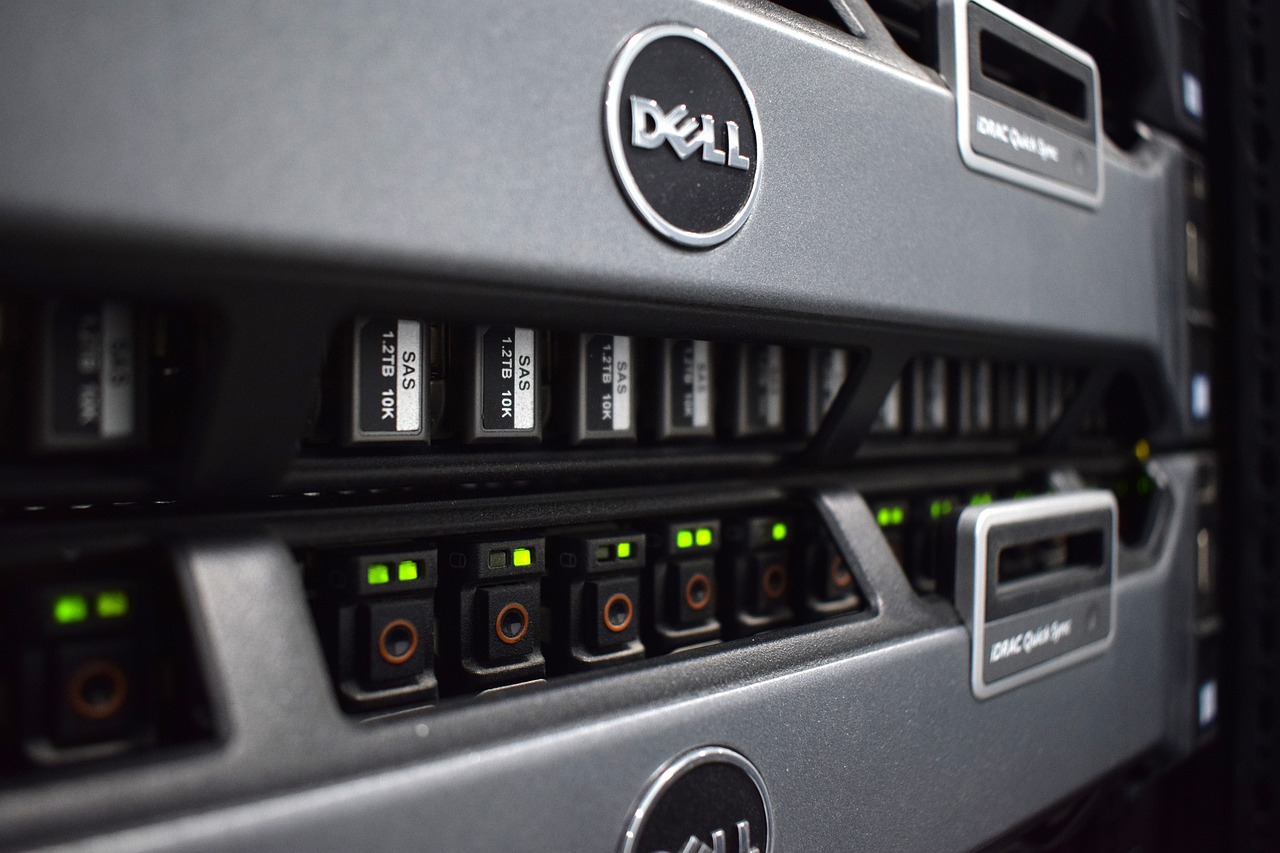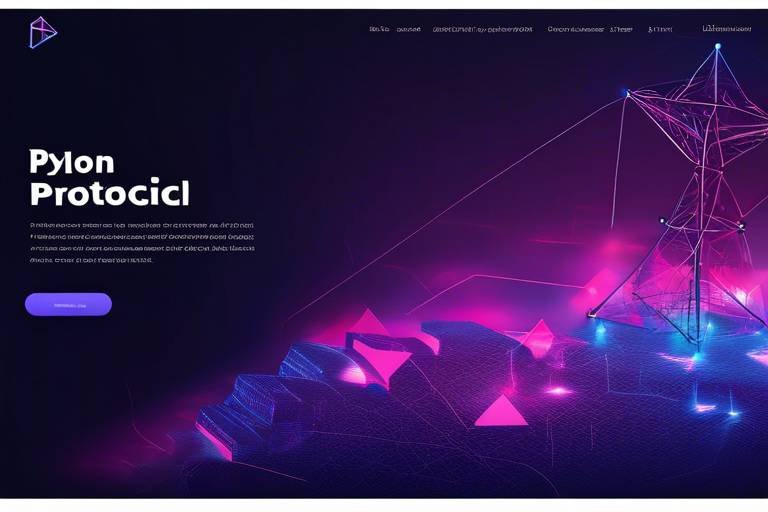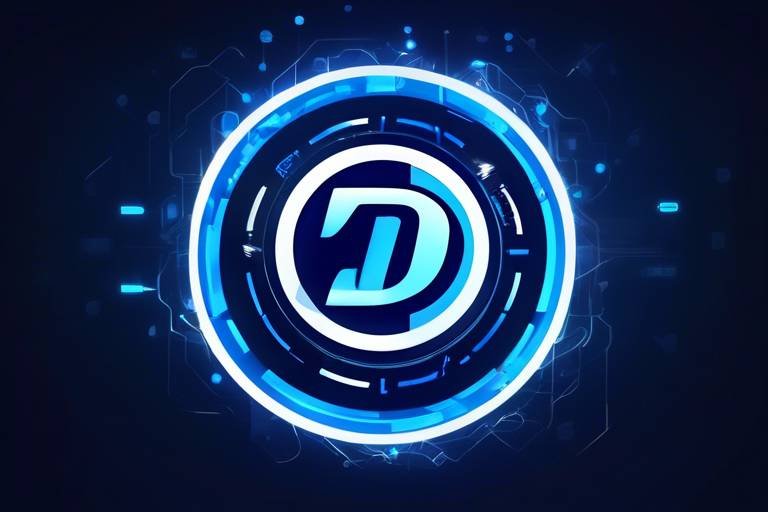Holo (HOT) - Decentralized Hosting for Applications
In a world where digital applications are becoming increasingly integral to our daily lives, the need for reliable and efficient hosting solutions has never been more pressing. Enter Holo, a groundbreaking platform that offers decentralized hosting for applications. But what exactly does this mean? Simply put, Holo leverages the power of peer-to-peer technology to create a hosting environment that is not only scalable but also energy-efficient. Imagine a world where applications can run seamlessly without the constraints of traditional centralized servers. That’s the promise Holo brings to the table.
Holo is built on the innovative framework of Holochain, which allows for the creation of applications that are not reliant on a single centralized authority. This means that developers can create applications that are more resilient, flexible, and capable of adapting to user needs. The implications of this are profound: applications can now operate in a decentralized manner, offering users greater control over their data and interactions.
One of the most exciting aspects of Holo is its potential to revolutionize how we think about application hosting. With traditional hosting solutions, users often face issues like downtime, high costs, and limited scalability. Holo aims to tackle these challenges head-on. By utilizing a decentralized network of hosts, Holo can provide a more robust and reliable service that grows with the demands of its users.
As we delve deeper into the unique features of Holo, we’ll uncover how its approach to scalability, energy efficiency, and tokenomics sets it apart from other hosting solutions. The future of decentralized hosting is bright, and Holo is at the forefront of this emerging landscape. Whether you're a developer looking to build the next big dApp or a user seeking a more secure and efficient way to interact with applications, Holo offers a compelling solution that is worth exploring.
- What is Holo? Holo is a decentralized hosting platform that allows applications to run on a peer-to-peer network, providing enhanced scalability and energy efficiency.
- How does Holo differ from traditional hosting solutions? Unlike traditional hosting, Holo operates on a decentralized network, which means there is no single point of failure, and users have more control over their data.
- What are the benefits of using Holo? Holo offers numerous benefits, including improved scalability, energy efficiency, and a user-centric approach that prioritizes privacy and control.
- Can developers create decentralized applications (dApps) on Holo? Yes, Holo is specifically designed to support the development and hosting of decentralized applications.

Understanding Holochain
Holochain is the innovative backbone that powers Holo, setting it apart from traditional blockchain technologies. At its core, Holochain is designed to facilitate peer-to-peer applications, enabling users to interact directly without the need for centralized intermediaries. Imagine a world where applications can function seamlessly, like a well-oiled machine, with each part working independently yet cohesively. This is the magic of Holochain, where each application operates on its own network while still being part of a larger ecosystem.
Unlike conventional blockchains that rely on a global consensus mechanism, Holochain employs a unique architecture that allows each user to maintain their own chain of data. This means that instead of everyone having to agree on a single version of the truth, each participant can validate their own transactions while still being able to share information with others. It's akin to a group of friends each having their own diary, yet they can still share stories and experiences without needing to sync every detail with one another.
The architecture of Holochain is built around several key principles:
- Agent-Centric: Each user is an agent in the network, responsible for their own data and interactions.
- Data Integrity: Holochain ensures that data remains consistent and verifiable through cryptographic signatures.
- Scalability: Applications can grow organically without the bottlenecks associated with traditional blockchain networks.
This agent-centric approach not only enhances scalability but also improves the overall user experience. By removing the need for a central authority, Holochain empowers users to take control of their data and interactions. This is particularly important in today's digital landscape, where data privacy and ownership are hot topics. With Holochain, users can feel confident that they are not just another cog in a machine, but rather the drivers of their own digital journeys.
In summary, Holochain is more than just a framework; it's a revolution in how we think about decentralized applications. By allowing users to operate independently while still being part of a larger network, Holochain opens up a world of possibilities for developers and users alike. As we dive deeper into the features and benefits of Holo, it's essential to keep in mind the foundational role that Holochain plays in shaping the future of decentralized hosting.

Key Features of Holo
Holo stands out in the crowded arena of decentralized hosting platforms, primarily due to its unique features that cater to both developers and end-users. One of the most significant aspects of Holo is its ability to facilitate scalability without sacrificing performance. Unlike traditional hosting solutions that often face bottlenecks during peak usage, Holo's architecture allows applications to adapt and grow seamlessly. This adaptability is crucial in today's fast-paced digital world, where user demands can change in the blink of an eye.
Another defining feature of Holo is its emphasis on energy efficiency. In an age where environmental sustainability is more critical than ever, Holo's design minimizes energy consumption, making it a greener alternative for hosting applications. This is not just a minor detail; it reflects a broader commitment to reducing the carbon footprint of digital services. With Holo, developers can create applications that not only perform well but also contribute positively to the environment.
Moreover, Holo employs a peer-to-peer networking model, which enhances user interaction and application performance. This model allows users to connect directly with one another, bypassing traditional intermediaries. Imagine a world where your data isn't stored in a central server but is instead distributed across a network of users; this is the essence of Holo's approach. By enabling direct interactions, Holo enhances the overall user experience, making applications more responsive and engaging.
In addition to scalability and energy efficiency, Holo's tokenomics plays a pivotal role in its ecosystem. The HOT token is central to transactions within the Holo network, providing a means for developers to monetize their applications while ensuring that users can access a wide range of services. Understanding how the HOT token functions can help users and developers alike navigate the Holo ecosystem more effectively.
To summarize, Holo's key features can be encapsulated in the following points:
- Scalability: Applications can grow without performance issues.
- Energy Efficiency: A commitment to sustainability and reduced energy consumption.
- Peer-to-Peer Networking: Direct connections between users enhance performance and interaction.
- Tokenomics: The HOT token facilitates economic activities within the Holo ecosystem.
These features not only make Holo a compelling choice for developers but also pave the way for innovative applications that can redefine how we think about hosting in a decentralized world. As we continue to explore the possibilities of decentralized hosting, Holo is undoubtedly at the forefront, ready to lead the charge into a more connected and sustainable digital future.
1. What is Holo?
Holo is a decentralized hosting platform designed for applications, utilizing a unique framework called Holochain that enables peer-to-peer interactions.
2. How does Holo ensure scalability?
Holo employs a unique architecture that allows applications to grow dynamically without compromising performance, making it suitable for high-demand scenarios.
3. Why is energy efficiency important in Holo?
In an era where sustainability is crucial, Holo's energy-efficient design minimizes environmental impact, allowing developers to create applications that are both effective and eco-friendly.
4. What role does the HOT token play?
The HOT token is integral to the Holo ecosystem, enabling transactions and providing a means for developers to monetize their applications.
5. Can I build decentralized applications on Holo?
Absolutely! Holo is specifically designed for decentralized applications (dApps), providing the necessary infrastructure for developers to create innovative solutions.

Scalability Solutions
When it comes to decentralized hosting, scalability is often a make-or-break factor for developers. Holo has recognized this need and has crafted a unique approach to scalability that sets it apart from traditional platforms. In a world where applications can grow exponentially, Holo ensures that performance remains consistent, regardless of the number of users or data being processed. Imagine a bustling city where every new resident can find a home without overcrowding; that’s the essence of Holo’s scalability.
At the core of Holo's scalability solutions is its innovative architecture, which is designed to handle a significant amount of transactions without the bottlenecks typically associated with blockchain technologies. Instead of relying on a single chain of blocks, Holo employs a distributed model that allows for parallel processing. This means that multiple transactions can occur simultaneously, drastically increasing throughput. Think of it like a multi-lane highway where cars can zoom past each other without waiting in line—this is how Holo manages to keep things running smoothly.
Moreover, Holo's scalability is not just about handling more users; it's about adapting to the needs of developers as their applications evolve. With Holo, developers can seamlessly scale their applications up or down based on demand. This flexibility is crucial in today's fast-paced digital environment, where user preferences can shift overnight. For instance, during a major event or product launch, traffic can spike dramatically, and Holo ensures that applications remain responsive without crashing or sacrificing user experience.
To illustrate Holo's scalability capabilities, let's take a look at a comparison table that highlights key aspects of traditional hosting versus Holo's decentralized hosting:
| Feature | Traditional Hosting | Holo Decentralized Hosting |
|---|---|---|
| Transaction Speed | Slower due to centralized processing | Fast, with parallel transaction processing |
| Scalability | Limited by server capacity | Highly scalable, adapts to demand |
| Cost Efficiency | High costs for additional servers | Cost-effective as demand grows |
| Reliability | Single point of failure | Distributed network enhances reliability |
In summary, Holo's approach to scalability is a game changer for developers looking to create robust applications that can grow without limits. By leveraging a peer-to-peer network and a flexible architecture, Holo not only meets current demands but also anticipates future growth, positioning itself as a leader in the decentralized hosting arena.
- What is Holo? Holo is a decentralized hosting platform that enables peer-to-peer applications to run efficiently and sustainably.
- How does Holo achieve scalability? Holo uses a distributed architecture that allows for parallel transaction processing, which significantly enhances its scalability.
- What are the benefits of using Holo for developers? Developers benefit from Holo's flexibility, cost efficiency, and the ability to scale applications seamlessly based on user demand.
- Can Holo support high-traffic applications? Yes, Holo is designed to handle high traffic without compromising performance, making it suitable for applications with fluctuating user bases.

Peer-to-Peer Networking
In the realm of digital technology, the concept of peer-to-peer (P2P) networking is revolutionizing how applications operate and interact. Holo leverages this innovative model, allowing users to connect directly with one another without the need for a central server. Imagine a bustling marketplace where every vendor has their own booth, and customers can freely browse, negotiate, and transact without a middleman—this is the essence of P2P networking in Holo.
One of the standout features of Holo's P2P network is its ability to enhance user experience significantly. By enabling direct interactions, applications hosted on Holo can achieve lower latency and faster response times. This is akin to having a direct line to your favorite restaurant, where you can place your order without waiting in line or dealing with a busy operator. The result? A more fluid and satisfying experience for users, which is crucial in today's fast-paced digital world.
Moreover, the P2P architecture fosters a sense of community among users. When individuals can directly connect and collaborate, it creates an ecosystem where innovation thrives. Developers can build applications that not only serve individual needs but also cater to collective interests. For instance, social platforms can emerge where users share resources, knowledge, and support, leading to a more engaged and interactive environment.
Additionally, the decentralized nature of Holo's P2P networking contributes to enhanced security and privacy. In traditional hosting models, data is often stored on centralized servers, making it a prime target for hackers. However, in a P2P network, data is distributed across multiple nodes, significantly reducing the risk of a single point of failure. Each user retains control over their own data, akin to having a personal safe that only they can access. This not only protects sensitive information but also empowers users to make decisions about their data usage.
Furthermore, the scalability of Holo's P2P network is impressive. As more users join the network, the system can adapt and grow without compromising performance. This is like adding more lanes to a highway as traffic increases—everyone can move smoothly without bottlenecks. Developers can create applications that scale effortlessly, ensuring that performance remains consistent even as user demand fluctuates.
In summary, Holo's peer-to-peer networking model is a game-changer in the world of decentralized hosting. By facilitating direct user interactions, enhancing security, and promoting scalability, Holo sets the stage for a new era of application development. As we continue to embrace decentralized solutions, the potential for innovation and community-driven growth becomes limitless.
- What is Holo? Holo is a decentralized hosting platform that allows applications to run on a peer-to-peer network.
- How does peer-to-peer networking work in Holo? It allows users to connect directly with each other, enhancing performance and user experience.
- What are the benefits of using Holo for developers? Developers benefit from scalability, energy efficiency, and a more engaged user community.
- Is Holo secure? Yes, the decentralized nature of Holo provides enhanced security by distributing data across multiple nodes.

Energy Efficiency
In today's world, where environmental concerns are becoming increasingly paramount, is not just a buzzword—it's a necessity. Holo stands out in the crowded field of decentralized hosting by prioritizing sustainability in its design. Unlike traditional blockchain systems, which often require massive amounts of energy to validate transactions, Holo leverages a unique architecture that minimizes energy consumption. This means that not only are applications hosted on Holo more efficient, but they also reduce their carbon footprint significantly.
One of the key components of Holo's energy-efficient model is its use of peer-to-peer networking. This model allows users to connect directly with one another, bypassing the need for centralized servers that consume vast amounts of energy. By distributing the load across a network of peers, Holo enables applications to operate smoothly while using considerably less energy. Imagine a bustling marketplace where every vendor is directly connected to their customers, eliminating the need for a central hub—this is how Holo's architecture functions, creating a more sustainable ecosystem.
Moreover, Holo's design incorporates lightweight protocols that facilitate faster data transfers with lower energy costs. This efficiency is crucial for applications that require real-time interactions, such as gaming or video conferencing. The reduced energy consumption not only helps the environment but also translates into cost savings for developers and users alike. When you think about it, choosing Holo is like opting for an energy-efficient car over a gas guzzler; it's a smart choice that benefits both your wallet and the planet.
To illustrate the impact of Holo's energy efficiency, consider the following comparison:
| Feature | Traditional Hosting | Holo Hosting |
|---|---|---|
| Energy Consumption | High | Low |
| Environmental Impact | Significant | Minimal |
| Cost Efficiency | Higher Costs | Lower Costs |
As we move forward into an era where sustainability is key, Holo's commitment to energy efficiency positions it as a leader in the decentralized hosting space. By opting for Holo, developers and users are not just choosing a platform; they are embracing a vision for a greener future. This choice reflects a growing awareness of the importance of eco-friendly technologies and the role they play in shaping a sustainable digital landscape.
In conclusion, Holo's energy-efficient design is not merely an added benefit; it is a core aspect of its identity. As we continue to innovate and expand our digital horizons, embracing platforms that prioritize sustainability will be essential. Holo is paving the way for a new standard in decentralized hosting, where efficiency and environmental responsibility go hand in hand.
- What is Holo? Holo is a decentralized hosting platform designed to support peer-to-peer applications.
- How does Holo achieve energy efficiency? Holo utilizes a peer-to-peer networking model and lightweight protocols to minimize energy consumption.
- What are the benefits of using Holo? Benefits include lower energy costs, reduced environmental impact, and improved application performance.
- Can Holo support decentralized applications (dApps)? Yes, Holo is particularly well-suited for hosting decentralized applications.

Holo's Tokenomics
Understanding is essential for grasping how this decentralized hosting platform operates within its ecosystem. At the heart of Holo's economy lies the HOT token, which serves multiple purposes, from facilitating transactions to incentivizing developers and hosts. Unlike traditional cryptocurrencies that often rely on a single use case, HOT is designed to be versatile, enabling various functionalities that enhance the overall user experience.
The HOT token is not just a currency; it acts as a bridge between users and application developers. When users want to access dApps hosted on Holo, they pay with HOT tokens. This payment system ensures that developers receive fair compensation for their work, while users can enjoy a wide array of applications without the heavy fees often associated with centralized platforms. The tokenomics of Holo, therefore, promotes a healthy ecosystem where both developers and users thrive.
One of the standout features of Holo's tokenomics is its incentive structure. Hosts, who provide the computing power and storage for applications, are rewarded in HOT tokens based on the traffic and usage of the applications they support. This creates a symbiotic relationship where hosts are motivated to maintain high performance and reliability. It’s like a restaurant where the chefs (hosts) get paid based on how many customers (users) they serve. The better the service, the more customers come in, and the more the chefs earn.
To give you a clearer picture of how the HOT token functions within the Holo ecosystem, here's a brief overview:
| Function | Description |
|---|---|
| Payment for Services | Users pay HOT tokens to access dApps and services hosted on Holo. |
| Incentives for Hosts | Hosts earn HOT tokens based on the usage and performance of the applications they support. |
| Developer Rewards | Developers receive HOT tokens for creating and maintaining applications on the platform. |
As the demand for decentralized applications grows, the utility of the HOT token is expected to increase significantly. This leads us to consider the future of Holo's tokenomics. With more users flocking to decentralized solutions, the value of HOT tokens could appreciate, benefiting both early adopters and new users alike. It's a classic case of supply and demand; as more people engage with the platform, the tokens become more valuable.
In conclusion, Holo's tokenomics is not just a financial framework; it's a carefully designed ecosystem that fosters collaboration and innovation. By aligning the interests of users, developers, and hosts, Holo is paving the way for a sustainable future in decentralized hosting. So, if you're considering diving into the world of decentralized applications, understanding Holo's tokenomics is your first step toward unlocking the vast potential of this exciting platform.
- What is Holo? Holo is a decentralized hosting platform that allows users to host and access applications without relying on centralized servers.
- What is the HOT token? The HOT token is the native cryptocurrency of the Holo ecosystem, used for transactions and incentivizing participants.
- How do hosts earn HOT tokens? Hosts earn HOT tokens based on the traffic and usage of the applications they support on the Holo platform.
- Can I use HOT tokens for anything else? Currently, HOT tokens are primarily used for transactions within the Holo ecosystem, but their utility may expand as the platform grows.

Use Cases for Holo
Holo's decentralized hosting capabilities are a game changer in today's digital landscape, offering a plethora of use cases that cater to various industries. One of the most exciting aspects of Holo is its ability to host decentralized applications (dApps), which are gaining traction due to their transparency and user empowerment. Imagine a world where applications aren't controlled by a single entity but are instead managed by the users themselves. This is the promise of Holo, and it opens up a treasure trove of opportunities for developers and businesses alike.
With Holo, developers can create dApps that are not only scalable but also resilient to censorship. For instance, social media platforms built on Holochain can allow users to connect and share without the fear of content being removed arbitrarily. This is a significant shift from traditional models where a central authority dictates the rules. Moreover, Holo's architecture allows for seamless integration of these dApps across various devices, ensuring that users can access their favorite applications anytime, anywhere.
Another prominent use case for Holo lies within the gaming industry. As gaming continues to evolve, the demand for decentralized solutions that offer transparency and fairness is on the rise. Holo can facilitate the creation of games that reward players directly for their contributions, whether through gameplay or content creation. Imagine a virtual world where players can truly own their assets, trade them freely, and participate in a thriving economy without intermediaries. This potential is not just a fantasy; it's a reality that Holo is making possible.
Additionally, Holo's infrastructure is perfectly suited for virtual reality (VR) applications. As VR technology becomes more mainstream, the need for decentralized hosting solutions that can handle the massive data requirements and provide low latency becomes critical. Holo can support immersive experiences where users can interact in real-time, share content, and even collaborate on projects without being bogged down by centralized servers. This not only enhances the user experience but also democratizes access to cutting-edge technology.
Furthermore, Holo's decentralized hosting model can be leveraged in various sectors, such as education and healthcare. For instance, educational platforms can utilize Holo to create collaborative environments where students and teachers engage in real-time discussions, share resources, and maintain a record of their interactions without the risk of data manipulation. In healthcare, patient data can be securely stored and accessed on Holo, ensuring privacy and integrity while allowing for innovative applications like telemedicine.
In summary, the use cases for Holo are vast and varied, spanning multiple industries and applications. From empowering developers to create dApps that prioritize user control to revolutionizing gaming and virtual reality, Holo is paving the way for a decentralized future. As we continue to explore the potential of this platform, it becomes clear that Holo is not just a fleeting trend but a cornerstone for the next generation of digital interaction.
- What is Holo? Holo is a decentralized hosting platform that allows applications to run on a peer-to-peer network, enabling user control and scalability.
- How does Holo differ from traditional hosting solutions? Unlike traditional hosting, which relies on centralized servers, Holo distributes hosting across its network, enhancing security and reducing reliance on a single entity.
- What types of applications can be built on Holo? Holo supports a wide range of applications, including decentralized apps (dApps), gaming platforms, virtual reality experiences, and educational tools.
- Is Holo environmentally friendly? Yes, Holo emphasizes energy efficiency in its design, making it a sustainable choice for hosting applications.

Decentralized Applications (dApps)
Decentralized Applications, commonly known as dApps, are at the forefront of the digital revolution, and Holo is paving the way for their growth and development. Unlike traditional applications that rely on centralized servers, dApps leverage the power of decentralized networks, allowing for greater transparency, security, and user control. With Holo's unique architecture, developers can create dApps that not only function efficiently but also thrive in a community-driven environment.
One of the most exciting aspects of dApps on the Holo platform is their ability to operate without the need for a central authority. This means that users can engage with applications directly, fostering a sense of trust and collaboration. Imagine a world where your data isn't held hostage by a single company, but rather shared across a network of peers. This shift in paradigm is what makes Holo's approach to dApps so revolutionary.
Holo enables developers to build a wide range of dApps, from social networks to financial services, and even gaming platforms. For instance, consider a decentralized social media dApp where users can freely share content without fear of censorship or data exploitation. This is not just a dream; it's a tangible reality with Holo. The platform's infrastructure supports the creation of applications that prioritize user autonomy and data privacy.
Additionally, Holo's peer-to-peer networking enhances the performance of dApps. Instead of relying on a single server, which can become a bottleneck, dApps can distribute their workload across multiple nodes. This not only boosts speed but also ensures that applications remain operational even if some nodes go offline. The resilience of dApps on Holo is a game-changer for developers seeking to create robust applications that can withstand the test of time.
Moreover, the energy-efficient design of Holo means that dApps can operate sustainably. As developers become increasingly aware of their environmental impact, Holo provides a platform that aligns with their values. By utilizing a decentralized hosting solution, developers can reduce their carbon footprint while still delivering high-quality applications to users.
In summary, the potential for dApps on the Holo platform is vast. The combination of decentralization, peer-to-peer networking, and energy efficiency creates a fertile ground for innovation. As more developers embrace this model, we can expect to see a surge in creative applications that not only meet user needs but also challenge the status quo of traditional app development.
- What are dApps?
Decentralized Applications (dApps) are applications that run on a decentralized network, allowing for greater transparency and control for users. - How does Holo support dApps?
Holo provides a decentralized hosting platform that enables developers to create and deploy dApps efficiently, using peer-to-peer networking. - What are the benefits of using dApps?
Benefits include enhanced security, user control over data, and resilience against server failures. - Can I create my own dApp on Holo?
Absolutely! Holo provides the necessary tools and infrastructure for developers to create their own dApps tailored to specific needs.

Gaming and Virtual Reality
The gaming industry is undergoing a remarkable transformation, and at the heart of this evolution lies Holo. With its decentralized hosting capabilities, Holo is poised to revolutionize how games and virtual reality applications are developed and experienced. Imagine a world where players can engage in immersive experiences without the limitations imposed by traditional centralized servers. Holo's architecture allows for peer-to-peer interactions, enabling gamers to connect directly with one another, which not only enhances the experience but also reduces latency issues that often plague online gaming.
One of the most exciting aspects of Holo's platform is its ability to support a wide range of gaming genres. From role-playing games (RPGs) to massively multiplayer online games (MMOs), developers can create applications that leverage Holo's decentralized nature. This means that games can be built with a focus on community engagement, allowing players to contribute to the game's evolution. Think of it as a living, breathing ecosystem where players have a say in the development process, leading to a more personalized and engaging gaming experience.
Moreover, Holo's energy-efficient design aligns perfectly with the growing demand for sustainable gaming solutions. As the environmental impact of gaming becomes a more pressing concern, Holo stands out as a viable option for developers who want to minimize their carbon footprint. By utilizing a decentralized network, games hosted on Holo can significantly reduce the energy consumption associated with traditional server farms. This not only benefits the environment but also appeals to a growing segment of eco-conscious gamers.
To further illustrate Holo's potential in the gaming and virtual reality space, consider the following key advantages:
- Enhanced User Experience: Direct peer-to-peer connections eliminate the need for intermediaries, resulting in smoother gameplay and reduced lag.
- Community-Driven Development: Players can participate in decision-making processes, leading to games that better reflect their interests and preferences.
- Sustainability: Holo's energy-efficient hosting reduces the environmental impact of gaming, making it a responsible choice for developers.
As we look to the future, the integration of virtual reality (VR) with Holo's decentralized framework opens up even more possibilities. VR applications can benefit from the same peer-to-peer interactions that enhance traditional gaming. Imagine donning a VR headset and entering a virtual world where you can interact with players from across the globe in real-time, all without the constraints of a central server. This level of immersion and interactivity could redefine gaming as we know it.
In conclusion, Holo is not just another hosting platform; it is a catalyst for change in the gaming and virtual reality industries. By harnessing the power of decentralization, Holo empowers developers to create innovative and engaging experiences that resonate with players on a deeper level. As the demand for decentralized solutions continues to rise, Holo is well-positioned to lead the charge, paving the way for a new era of gaming that prioritizes community, sustainability, and immersive experiences.
Q1: What is Holo's role in the gaming industry?
A1: Holo provides a decentralized hosting platform that allows developers to create peer-to-peer gaming applications, enhancing user experience and community engagement.
Q2: How does Holo ensure energy efficiency in gaming?
A2: Holo's design minimizes reliance on centralized server farms, which significantly reduces energy consumption and the environmental impact of gaming.
Q3: Can players influence game development on Holo?
A3: Yes! Holo's decentralized nature allows players to participate in the development process, leading to games that better reflect their interests.

The Future of Decentralized Hosting
As we stand on the brink of a digital revolution, the future of decentralized hosting looks incredibly promising. With the increasing demand for privacy, security, and user autonomy, platforms like Holo are set to transform the way we interact with applications and services online. Imagine a world where your data isn't controlled by a handful of tech giants but is instead distributed across a network of peers. This shift is not just a trend; it’s a paradigm change that could redefine our digital experiences.
One of the most exciting aspects of decentralized hosting is its potential to promote innovation in application development. Developers are no longer constrained by centralized servers and their limitations. Instead, they can create applications that are resilient, scalable, and capable of adapting to user needs in real time. This flexibility opens the door to a wide range of possibilities, from decentralized finance (DeFi) to social media platforms that prioritize user privacy.
Furthermore, as the environmental impact of technology becomes a pressing concern, decentralized hosting offers a more sustainable alternative. Traditional data centers consume vast amounts of energy and contribute to carbon emissions. In contrast, Holo's energy-efficient design not only reduces the carbon footprint but also empowers individuals to host applications on their own devices, fostering a more eco-friendly digital ecosystem.
In addition to sustainability, the security benefits of decentralized hosting cannot be overstated. With data spread across a network, the risk of a single point of failure is significantly diminished. This means that applications hosted on Holo are less vulnerable to hacks and data breaches, providing users with greater peace of mind. In a world where data privacy is a growing concern, the ability to control one’s data is a game-changer.
Looking ahead, we can expect several trends to shape the future of decentralized hosting:
- Increased Adoption: As awareness of decentralized technologies grows, more developers and users will gravitate towards platforms like Holo.
- Interoperability: Future developments will likely focus on ensuring that different decentralized applications can work together seamlessly, enhancing user experience.
- Enhanced User Experience: Innovations in user interfaces and application design will make it easier for everyday users to interact with decentralized applications.
- Regulatory Frameworks: As decentralized hosting gains traction, regulatory bodies may establish guidelines to ensure compliance while fostering innovation.
In conclusion, the future of decentralized hosting is not just about technology; it's about empowering users and creating a more equitable digital landscape. As platforms like Holo continue to evolve, they will pave the way for a new era of internet applications that prioritize user autonomy, security, and sustainability. The potential is vast, and the journey is just beginning.
Q1: What is decentralized hosting?
A1: Decentralized hosting refers to the use of a network of computers to host applications and services, rather than relying on centralized servers. This approach enhances security, scalability, and user control.
Q2: How does Holo differ from traditional hosting services?
A2: Holo utilizes a peer-to-peer network, allowing users to host applications on their own devices. This reduces reliance on centralized data centers and enhances privacy and security.
Q3: What are the benefits of using decentralized hosting?
A3: Benefits include improved security, reduced environmental impact, greater user control over data, and the potential for innovation in application development.
Frequently Asked Questions
-
What is Holo?
Holo is a decentralized hosting platform designed for applications, leveraging the unique capabilities of Holochain. It enables peer-to-peer interactions, allowing users to host applications directly on their devices without relying on centralized servers.
-
How does Holochain differ from traditional blockchain technologies?
Unlike traditional blockchains that rely on a global ledger, Holochain uses a distributed hash table (DHT) for data storage, which allows for greater scalability and energy efficiency. Each application can operate independently without needing to compete for space on a single chain.
-
What are the key features of Holo?
Holo's standout features include scalability, energy efficiency, and a peer-to-peer networking model. These elements make it an attractive option for developers looking to create decentralized applications that can handle large user bases without compromising performance.
-
Can you explain Holo's tokenomics?
The HOT token plays a crucial role in the Holo ecosystem, serving as the currency for transactions and incentivizing hosts to provide resources for decentralized applications. Understanding its economic model helps users and developers navigate the platform effectively.
-
What types of applications can be built on Holo?
Holo is especially well-suited for decentralized applications (dApps), gaming, and virtual reality solutions. Its infrastructure supports a wide range of use cases, allowing developers to create innovative applications that leverage the benefits of decentralization.
-
What is the future of decentralized hosting with Holo?
As the demand for decentralized solutions continues to grow, Holo is poised to make a significant impact in the hosting landscape. Future developments may include enhanced scalability features, broader adoption of dApps, and increased integration with other decentralized technologies.



















